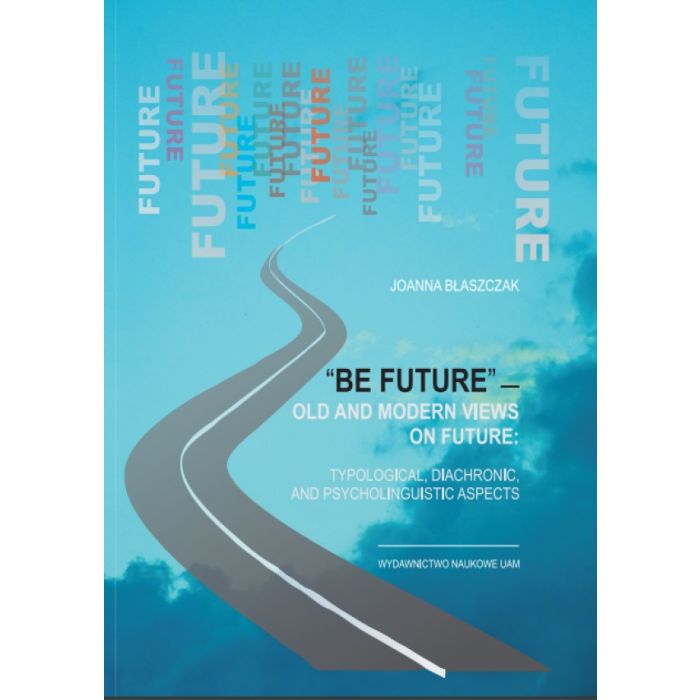“Be future” – Old and Modern Views on FUTURE: Typological, Diachronic, and Psycholinguistic Aspects
- In Stock: in stock
- ISBN: 978-83-232-3400-5
- Category: English Philology, Linguistics
- Year of publication: 2019
Monografia podejmuje zagadnienie charakterystyki temporalnej zdań, a w szczególności kategorii czasu przyszłego. Jakkolwiek mogłoby się wydawać, że każda wypowiedź, z racji funkcji informowania o zjawiskach w świecie pozajęzykowym, musi przekazywać informację temporalną, spora część wypowiedzi znajduje się poza kategorią czasu. Stąd czas, ogólnie rozumiany jako kategoria zdarzeń będących treścią danej wypowiedzi, która służy określeniu relacji temporalnych pomiędzy samym zdarzeniem i momentem, który jest punktem odniesienia, od dawna stanowi przedmiot badań i sporów, zarówno w obrębie językoznawstwa, jak i innych nauk, w tym przede wszystkim filozofii. Czas przyszły zajmuje w tych debatach szczególne miejsce, bowiem w odróżnieniu od czasu przeszłego i teraźniejszego, zdania w czasie przyszłym nie są zdaniami faktywnymi i nie poddają się w momencie wypowiedzenia falsyfikacji, przez co czas przyszły jest w większym niż pozostałe czasy stopniu używany w różnych funkcjach nietemporalnych, a przede wszystkim w funkcjach modalnych. Językowym refleksem szczególnego statusu czasu przyszłego są nietypowe w porównaniu z innymi czasami wykładniki czasu przyszłego, często obserwowane w językach z kategorią czasu gramatycznego. Autorka opiera swoje badania na szerokim materiale źródłowym, uwzględniając języki nieeuropejskie, śledząc rozwój badanych konstrukcji od wczesnych etapów badanych języków po współczesność, a także sięga po eksperymenty psycholingwistyczne dla rozstrzygnięcia istotnego pytania badawczego, jakim jest pytanie o naturę oboczności formy bezokolicznikowej i imiesłowowej czasownika leksykalnego w konstrukcji złożonego czasu przyszłego w języku polskim.
The monograph deals with the issue of the temporal characteristics of sentences, in particular the category of the future tense. Even though it may seem that each utterance, due to its function of proving information about phenomena in the non-linguistic world, must provide temporal information, a large number of utterances actually fall outside the category of tense. Hence, tense, generally understood as a category of events that are the content of a given utterance which serves to define temporal relations between the time of an event and the time which is the reference point, has long been the subject of research and disputes within both linguistics and other sciences, including primarily philosophy. The future tense occupies a special place in these debates because, in contrast to the past and present tenses, sentences in the future tense are not factive and hence cannot be verified at the moment of speaking. Thus, the future tense is used more than other tenses in different nontemporal functions and especially in modal functions. The linguistic reflex of the special status of the future tense, in comparison with other tenses, are its unusual markers (ways in which it is realized), often observed in languages with a grammatical tense category. The author of the present book bases her research on a wide range of source materials, including non-European languages, following the development of the structures under investigation from the early stages of the languages being studied to the present times, and also uses psycholinguistic experiments to resolve an important research question: the question of the nature of the alternation between the infinitival and the participial form of the lexical complement of the future auxiliary in compound future constructions in Polish.
| Detailed information | |
|---|---|
| Table of contents |
Download file

|
|
|
|
| Publication Version | printed |
| Format | 17,0 x 24,0 |
| Type of publication | Monografia |
| Edition | I |
| Series | Filologia Angielska nr 63 |
| ISSN | 0554-8144 |
| ISBN | 978-83-232-3400-5 |
| Number of pages | 500 |
| Number of publishing sheets | 34,00 |
| Type of binding | hardcover |
